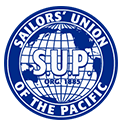Cargo Preference Essential Element For Us Merchant Marine, National Security
Posted on May 23, 2023 by Seapower Staff
Rear Admiral Mark H. Buzby, USN (Ret)
Recently, there have been renewed calls by some to do away with – or greatly diminish – the requirements that govern the sea transportation of cargo that is owned, procured, furnished, or financed by the US Government – better known as Cargo Preference.
A removal of the current 50% requirement would have immediate and devastating effect on the US flag fleet. I state this with the confidence of having observed multiple US flag ships “flag out” of US registry when a change to Cargo preference statutes in 2013 reduced the required US carriage percentage of non-DOD government cargo from 75% to 50%. Doing away with Cargo preference requirements would directly result in the reduction in the size of the already small US flag deep sea fleet, adversely impact the size of the correspondingly small pool of US citizen seafarers, and jeopardize our Nation’s ability to execute sealift of US forces in times of crisis or conflict.
As MARAD Administrator, I testified often of the “three -legged stool” of maritime policy that underpins and supports the U.S.-flag merchant marine: the Jones Act, the Maritime Security Program (and newly enacted Tasker Security Program), and Cargo preference. Cargo preference is the least understood of the three, and it is under direct attack now. Short-sighted detractors are now pushing to end cargo preference for food aid programs like Food for Peace, in which American-grown food is moved on American-flagged ships to help those in need in the some of the poorest parts of the world. This has been a successful program for nearly 70 years helping to provide much needed food and aid to families starving and suffering from famine and conflict. At the same time, these programs support American famers, American truckers, American rail operators, American manufacturers, American milliners, American oil and flour producers, American longshoremen, and American mariners. Currently, only half of all those cargos must travel in US flagged vessels.
We should not underestimate the strong signal that a US flag ship delivering life saving food and aid sends to everyone that the US is there and engaged. Putting food aid on flags of convenience says nothing…just another government hand out. Cargo preference is an important component of global engagement, non lethal and peaceful.
Other Cargo preference statutes date back to 1904, stipulating that 100% of Department of Defense cargo must travel in US flagged vessels, ensuring a safe and secure means to deliver our fighting forces and their sustainment around the globe. Imagine if such a statute was not in place and the movement of military cargos was dependent on the whims of a foreign flag carrier during times of heightened tension or crisis. I don’t think we want to go there.
Lacking a comprehensive national maritime strategy that coherently and comprehensively ties together the contributions of our civilian merchant marine and our uniformed sea services (Navy, Marine Corps, Coast Guard, and NOAA) to our national defense and economic security, the individual elements of maritime policy which are “sailing in loose formation” today are susceptible to attack from special interests not aware of the important role each plays in support of the other. The attacks on Cargo preference are a perfect example; a seemingly detached policy focused on moving food aid and other government cargos helps sustain a sizeable percentage of the US Flag fleet, which provides jobs for the maritime work force, which is the same pool of mariners the US government will depend upon to activate and sail our Ready Reserve Force sealift fleet to transport and sustain US and allied forces in times of national emergency. The math is simple: reduced cargo equals reduced ships, fewer ships equals fewer crews, and fewer crews means we cannot man our sealift ships.
President Xi and the Chinese Communist Party (CCP) have has made their interest in dominating the maritime sector perfectly clear: they construct 80% of ship to shore cranes, 86% of intermodal chassis, and 95% of the worlds shipping containers. Their shipyards turnout 47% of the world’s shipbuilding tonnage, and PRC companies operate over 5,500 merchant ships. They subsidized their shipbuilding industry by over $132 billion from 2010-2018. The CCP knows what the British Empire knew, what the Founding Fathers knew, what Rear Admiral Alfred Thayer Mahan postulated in 1890: control the seas, control the world.
I want to be clear: ending cargo preference will create national security risks, and lack of cargo will continue to shrink the size of the US maritime fleet and reduce US sealift capability at a time when we cannot afford to give up one ship or lose a single mariner. The adverse ripple effect will extend to the shore side maritime and shipbuilding industry as well. I encourage Congress to reject misguided and unwise proposals that will make us even more dependent on the Chinese Communist Party for our economic health and instead support a robust US maritime policy that will sustain the US commercial sealift needed to support US national security.
Rear Admiral Buzby served as Maritime Administrator from 2017-2021. He retired from the US Navy in 2013 after 34 years of service which included command of the US Navy’s Military Sealift Command. Prior to serving as MARAD Administrator, he was President of the National Defense Transportation Association.
Check out the article in Seapower.
SHIP AMERICAN!
The nation's cargo preference rules go back to the Cargo Preference Act of 1954. The idea then, as it is now, was that some or most government-impelled cargo should be carried by U.S.-flag ships, owned and crewed by Americans.
Today the requirement is that 50% of these cargoes are carried in U.S. ships, subject to availability and other conditions.
Routinely evaded and sometime attacked, Ship American rules for government cargoes are like Buy American rules for government purchasing.
The latest attack comes as part of the Ukrainian supplemental funding bill in May of 2022, associated with the Ukraine-Russian war.
The San Francisco Maritime Trades Port Council adopted the following resolution denouncing the effort of just two senators to subvert the cargo preference rules, part of the nation's maritime cabotage system.
RESOLUTION
IN SUPPORT OF
SHIP AMERICAN CARGO PREFERENCE RULES
SAN FRANCISCO PORTS COUNCIL
MARITIME TRADES DEPARTMENT
AFL-CIO
WHEREAS, the San Francisco Ports Council of the Maritime Trades Department, AFL-CIO has steadfastly fought to improve the wages, working conditions of U.S. maritime workers and to maintain the legal foundations that support the U.S. Merchant Marine as a source of working-class jobs, good benefits, and more broadly the economic prosperity and security of the nation, and;
WHEREAS, chief among these legal foundations is the Jones Act, the Maritime Security Program, and the Ship American or cargo preference rules, which together form a maritime cabotage system that is the envy of the world, and;
WHEREAS, the U.S. Senate is now considering amendments to the second Ukrainian supplemental aid bill, a small part of which in Concurrent Resolutions 37 and 38 authored by Senators Joni Ernst and Chris Coons) would broadly waive the cargo preference requirements of worldwide food relief available under America’s Food for Peace Program (PL-480), and;
WHEREAS, the cargo preference waivers are unnecessary since waivers are already available within existing law, and;
WHEREAS, the waivers overly broad as crafted to apply to all markets not just the Ukraine affected markets, as well as open-ended since there is either an arbitrary indefinite or three-year of applicability, and;
WHEREAS, the cargo preference waivers will allow foreign-flag, foreign-crewed ships to move U.S. taxpayer funded cargo to the diminishment and detriment of U.S. shipping and U.S. sailors which is to betray an industry and a workforce that existed from the outset of the nation, and;
NOW, THEREFORE, BE IT RESOLVED that the San Francisco Maritime Trades Ports Council herewith opposes Senate Concurrent Resolutions 37 and 38 in the Ukrainian supplemental funding legislation and any subversion of U.S. cargo preference law, and;
BE IT FURTHER RESOLVED, that the Council calls instead for a Congressional affirmation of the nation’s Merchant Marine and the underlying cabotage laws that connect American prosperity and charity programs with good jobs for American mariners and maritime workers, and;
BE IT FINALLY RESOLVED, that the Council will communicate this message to MTD Headquarters, to other Port Councils, the U.S. House of Representatives, and the U.S. Senate and in particular the California Senators Diane Feinstein and Alex Padilla.


